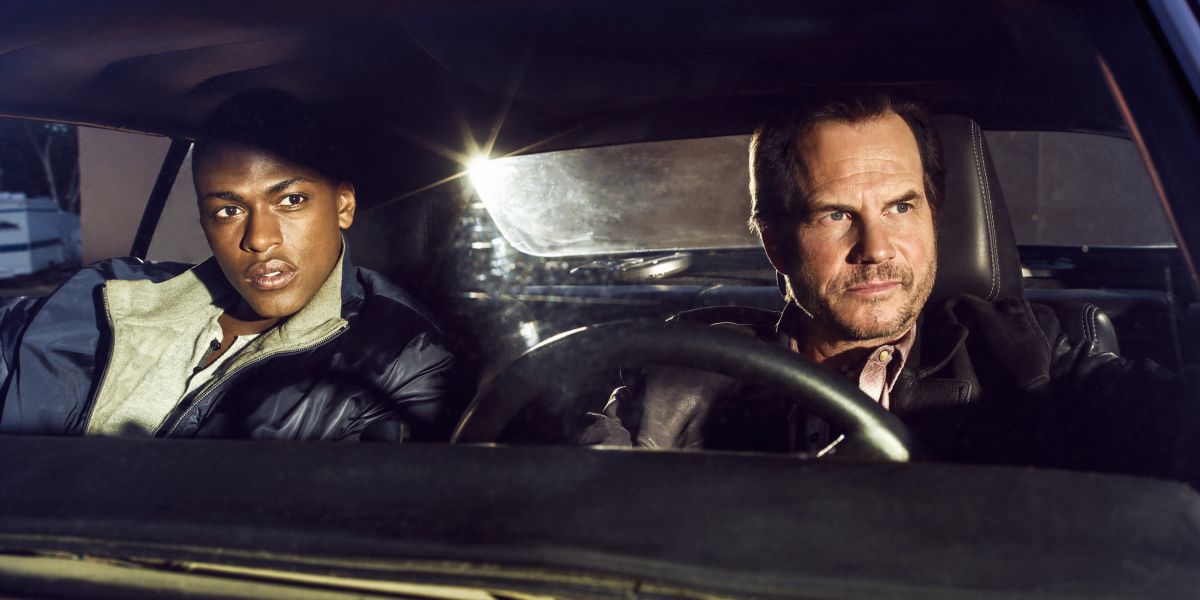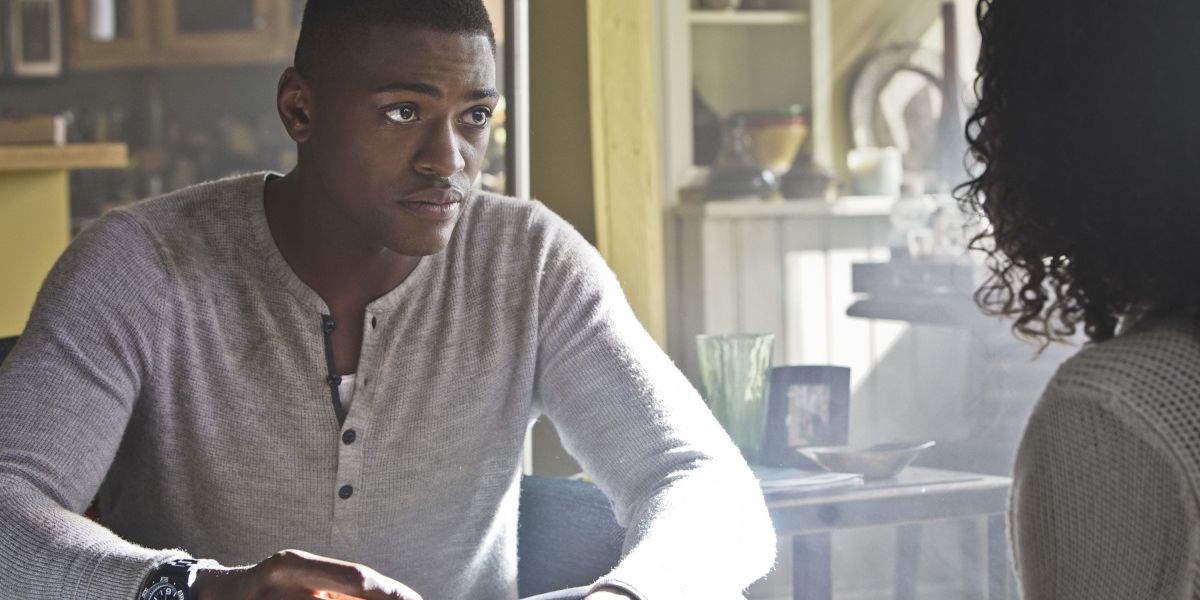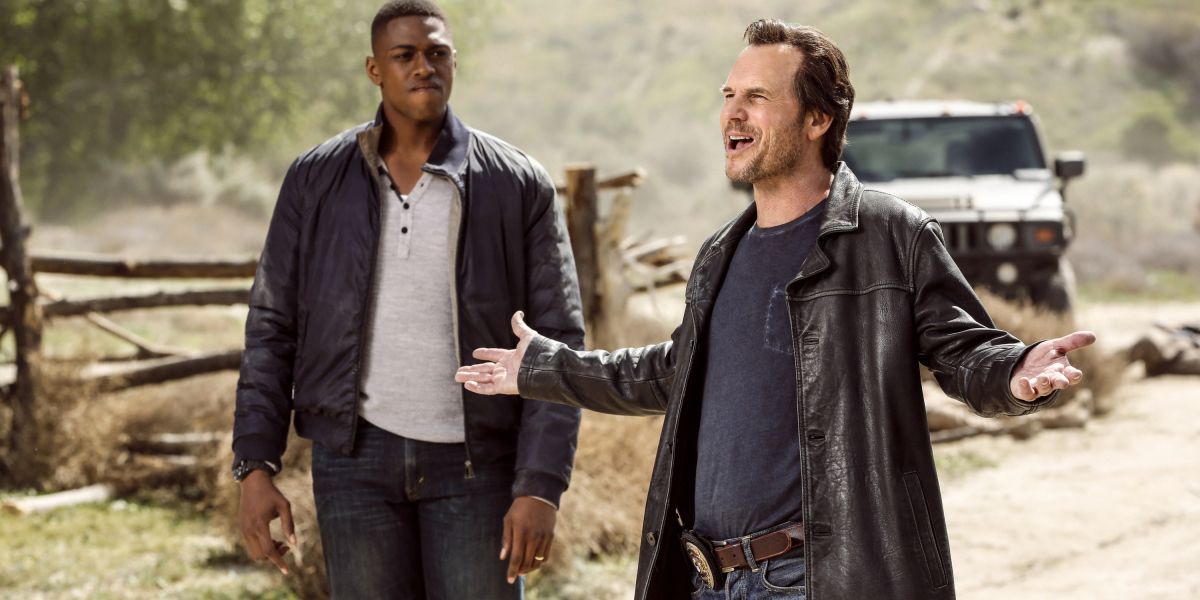As commonplace as it has become to see films inexplicably adapted to television as ongoing, sometimes-watered-down versions of their original R-rated adventures, the idea that Antoine Fuqua's 2001 Training Day – for which Denzel Washington won his second Academy Award – would be translated into a police procedural for CBS was likely not at the top of anyone's list. For starters, the film is over a decade old; its award-winning bona fides aside, it wasn't overwhelmingly well received by critics. But mostly, it never spawned a sequel, and for good reason. The film worked best as a one-and-done story. Its dark tale of corruption and violence told through a single day in the lives of some colorful characters was not yearning for the right creative team to come along and explore its expanded universe. That is, until now, apparently.
The series takes the smog-filtered golden hues that painted the original film's color palate and interprets them as inspiration for the tone of its ongoing narrative. Bill Paxton's Det. Frank Roarke is intended to be the analogue to Washington's Alonzo Harris but asking Paxton to deliver a performance with the same light-bending gravitational force as only Washington can, and on a weekly basis, would be a disservice to both performers. Paxton is more than capable of handling heavy material, but even then he brings a completely different energy. Here, he vacillates between southern-fried do-gooder and barely tethered loose cannon. Asking Paxton to essentially recreate Alonzo Harris would be akin to asking Washington to yell "Game over, man" and have it not be perceived as a threat to a bunch of drooling aliens.
The series, executive produced by Fuqua and Jerry Bruckheimer, aims to go in another direction, to flip the original film's premise. Instead of a dark descent down a rabbit hole of corruption, Training Day aims to maintain itself with a question of redemption: whether or not Frank's trainee, the driven, straight-laced Officer Kyle Craig (Justin Cornwell) can effectively "train" him to be a good cop once more. It's a necessary alteration that suits the long-form storytelling of this sort-of procedural endeavor. The presence of a goal, for both Kyle and, however unwittingly, for Frank, helps ground a network series that might otherwise get too caught up in The Shield-ness of it all: that immensely strong pull of the criminal underworld and those on the right side of the law who've succumbed to its temptations.
Paxton is undoubtedly the star of this show, and Training Day frames its lead as a maverick so consumed by the circumstances of his profession he's willing to break bad in order to do good. Frank isn't entirely a bad guy; he just abhors rules and has a very clear idea of what his role in law enforcement entails. Much of that is deciding who deserves to live and who does not, mostly with little regard for those caught in the crossfire. At least that's what Frank wants people like Kyle to believe.
Early on, the pilot episode introduces a huggable subplot where Frank takes a conveniently precocious and parentless kid under his wing – despite Frank's palpable aura of not giving a damn. The kid is being courted by a local dope pusher and wound up with a shiner for saying no to drugs. He goes to the cops for help and winds up getting a crash course on the universe's indifference to his plight and a free breakfast for his troubles. All told, the kid kind of breaks even. That is until Frank returns at the episode's end with a hefty trust fund for the kid and the promise he's under the protection of Det. Maverick Cop.
That is how Training Day works. The series is committed to flirting with a walk on the dark side, but because it's essentially a CBS procedural, it can't or won't go all in, and instead remains on the margins of its characters' moral ambiguity. There is an elaborate set of checks and balances that renders a show about immorality and possible redemption strangely undecided about both. The effect is a distinctly familiar affair that would be utterly bland if not for Paxton's toothsome performance.
In an attempt to keep Paxton from carrying the series by his lonesome, Training Day introduces an overarching mystery that involves the suspicious murder of Kyle's father – a detective who worked with Frank and hid a similarly questionably criminal lifestyle from his son. His father's death is the impetus for all of Kyle's decisions, like the one to work undercover for Marianne Jean-Baptiste's potentially more-corrupt-than-Frank Deputy Chief Joy Lockhart, who recruits the young officer in a hallway of all places. The plot is there mostly to give the series something to work towards that also justifies Frank's actions and offers Kyle a chance to be more than Jiminy Cricket to a grizzled cop.
The pursuit of a greater purpose for Kyle will be important for the series moving forward. His role in the pilot seesaws between delivering stilted exposition and reacting as things happen to him. His kidnapping at the hands of a goofy drug lord who goes by the name Blowtorch Bob is a good example of how passive Kyle's character is written. In the first hour, he's only asked to react to everything that's going around him. The pilot episode's end repositions Kyle as the plot's new driver. It will be interesting to see whether or not Training Day can successfully shift its focus or if it will continue to rely solely on Bill Paxton.
Training Day suffers from the same not-intended-for-primetime problems as other film-to-TV adaptations, like FOX's Lethal Weapon (though that has improved slightly since the pilot). With the series firmly set up by the pilot episode's end, perhaps the series can find its groove away from stilted dialogue, bland characterizations, and mechanical shootouts. Then again, maybe the series hasn't been trained for anything else.
Next: Lethal Weapon Series Premiere Review & Discussion
Training Day continues next Thursday with 'Tehrangeles' @10pm on CBS.
Photos: CBS



